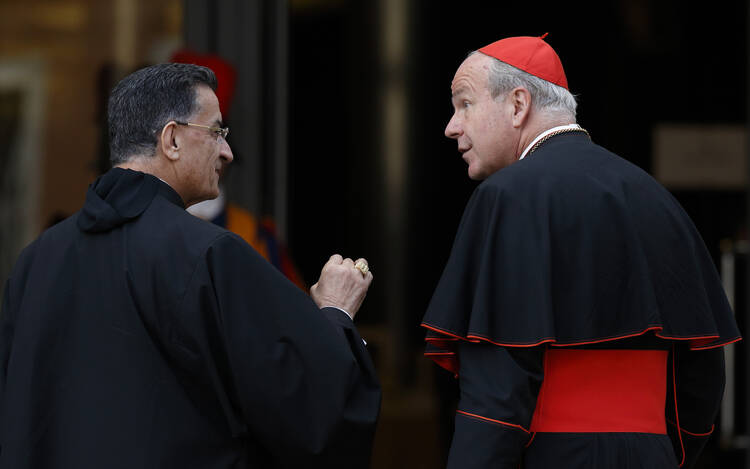Austrian Cardinal Christoph Schonborn of Vienna, one of the Catholic Church's best known cardinal-theologians, said the Catholic Church must hold together truth and mercy, even if it is criticized for its attempt.
The cardinal, editor of the Catechism of the Catholic Church and the son of divorced parents, led one of the small working groups at the Synod of Bishops on the family. He spoke to reporters Oct. 16 about the groups' attempts to improve the synod's midterm report, which had garnered attention around the world for its seeming openness to people living in situations the church traditionally has labeled as irregular or sinful.
As synod officials were set to modify the midterm report to draft the synod's final report, all 10 working groups called for a clearer presentation of church teaching and a greater emphasis on how Catholic families striving to live according to that teaching are a blessing for the church and for their societies.
To ensure people do not think the church is watering down its teaching on marriage and sexual morality, Cardinal Schonborn said, "many of the synod working groups said, 'Attention! We do not want to forget doctrine in those situations" in which people must be accompanied on the way to a fuller Christian life.
"The first place where the results of original sin are manifested is the family, where we live," he said. But the synod preparatory document wanted to emphasize "the beauty and the necessity of the family. For this reason, we were invited to look attentively at the reality around us. I think this was the idea of the questionnaire sent around the world: 'Tell us how the family is doing.'"
To understand the work synod members are trying to do, he said, people must understand what Pope Francis means when he talks of "accompanying. Many times he has said, 'Don't judge; accompany.' Is that relativism? No, certainly not."
Still, Cardinal Schonborn said, the synod itself mirrored the differences one might find in a family's approach to new situations. "It often happens in a family that the mother says, 'It's too dangerous,' and the dad says, 'No, don't be afraid.' We're in a big family and some say, 'Attention!' and they are right, it's dangerous. But others say, 'Don't be afraid.'"
Different emphases are normal, he said, because "there are different aspects to consider: There is doctrine and the clear word of the Gospel and there is the evident action of Jesus showing an attitude full of mercy and compassion. How to unite the two is a perennial challenge for the church, its pastors and all of us."
When the church addresses situations in which people have fallen short of the Gospel ideal, he said, it must "speak the truth," but "it does so with compassion and with an invitation to undertake a journey of faith."
At the meeting with the press, the cardinal was asked whether he thought the Catechism of the Catholic Church would have to be rewritten after the synod; among other things, the catechism teaches that homosexuality is a "disordered" inclination and that homosexual acts are sinful; it also says that those who are divorced and civilly remarried may not receive Communion without an annulment.
The cardinal said the catechism "is a synthesis of what the church believes and lives" and he sees no reason to change it, although "there are developments" of Catholic doctrine and there have been throughout history. As an example of a "notable development of doctrine" he cited St. John Paul's "theology of the body," which he said was the first systematic theological discussion of the human body and its role in relationships.








